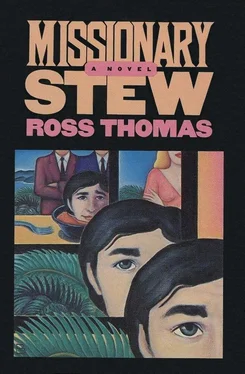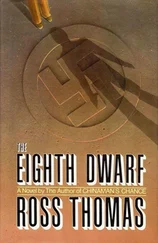Ross Thomas - Missionary Stew
Здесь есть возможность читать онлайн «Ross Thomas - Missionary Stew» весь текст электронной книги совершенно бесплатно (целиком полную версию без сокращений). В некоторых случаях можно слушать аудио, скачать через торрент в формате fb2 и присутствует краткое содержание. Город: New York, Год выпуска: 1983, ISBN: 1983, Издательство: Simon & Schuster, Жанр: Политический детектив, на английском языке. Описание произведения, (предисловие) а так же отзывы посетителей доступны на портале библиотеки ЛибКат.
- Название:Missionary Stew
- Автор:
- Издательство:Simon & Schuster
- Жанр:
- Год:1983
- Город:New York
- ISBN:978-0-671-49363-9
- Рейтинг книги:3 / 5. Голосов: 1
-
Избранное:Добавить в избранное
- Отзывы:
-
Ваша оценка:
- 60
- 1
- 2
- 3
- 4
- 5
Missionary Stew: краткое содержание, описание и аннотация
Предлагаем к чтению аннотацию, описание, краткое содержание или предисловие (зависит от того, что написал сам автор книги «Missionary Stew»). Если вы не нашли необходимую информацию о книге — напишите в комментариях, мы постараемся отыскать её.
Missionary Stew — читать онлайн бесплатно полную книгу (весь текст) целиком
Ниже представлен текст книги, разбитый по страницам. Система сохранения места последней прочитанной страницы, позволяет с удобством читать онлайн бесплатно книгу «Missionary Stew», без необходимости каждый раз заново искать на чём Вы остановились. Поставьте закладку, и сможете в любой момент перейти на страницу, на которой закончили чтение.
Интервал:
Закладка:
“To identify the dead men?” Citron said.
“Yes.”
“Who were they?”
“Nine were killed in the battle. Five were of the CIA.”
“And the other four?”
Mr. Eckys smiled. “They were of the FBI.”
Chapter 30
Citron and Mr. Eckys walked back through the trees to the rutted trail in silence. When they reached it, Citron turned to the one-armed man. “You say the Cubans identified them — the dead men?”
“Yes. We contacted them and they dispatched an agent.”
“From Havana?”
Mr. Eckys looked at Citron with pity. “Havana? Certainly not. From Miami.”
“Yes,” Citron said. “Of course.”
“A strange man for a secret agent.”
“How so?”
“He drank. He made advances to our women. He boasted of how rich his family was before Fidel came down from the mountains.”
“Did he have a name?”
Mr. Eckys shrugged. “He had many names and several passports. Venezuelan. Chilean. USA. At first, we suspected him. He was not of a serious disposition. But he was shrewd. Even when we got him drunk and supplied him with one of our cleverest women, he gave nothing away. All he wanted to talk with our woman about were the old days in Havana when his family owned all the milk in Cuba. Or so he claimed. Nevertheless, we decided to entrust him with the photos of the nine dead gringos. A week later he sent us their names and particulars by a Tucaereo purser who is one of our sympathizers.” Mr. Eckys frowned at Citron. “Why do you smile?”
“I’m sorry,” Citron said. “I did not know that I was.”
“It was not a pleasant smile.”
“I’m sorry.”
“I suppose you desire the list.”
“Very much.”
“With the list can Mr. Haere topple the fascist government in Washington?”
“He can only try, but I assure you his desire to do so is a burning one.”
“And the new government — would it be less supportive of our generals?”
“Who could promise that? But I fail to see how it would not be an improvement. A great improvement.”
Mr. Eckys thought about it. “Yes,” he said finally. “What you say is true. I will give you the list.” He reached into his left hip pocket and brought out an 8½-by-11-inch sheet of ordinary typewriter paper that had been folded into quarters. “Perhaps in your propaganda you could mention us.”
“The Committee of a Thousand Years.”
“Yes.”
“I will mention you.”
“Thank you.” Mr. Eckys handed over the sheet of paper.
Citron unfolded it. There were two headings. One was CIA and the other was FBI. Under the CIA heading were the names of five men along with their ages and their home addresses. Most of them lived in either Maryland or Virginia. Citron wondered if the Cuban secret agent had obtained their home addresses from telephone books.
The first two names of the four presumably dead FBI agents jumped up at Citron’s eyes. He felt himself start. The first name was John D. Yarn. The second man was Richard Tighe, no middle initial.They really can leap out at you, he thought. They can actually jump right off the page.
“You are smiling again,” Mr. Eckys said.
“What?”
“I said you are smiling again. That same smile. I have seen men of wide experience smile just like that. Their experience has been both good and bad, but mostly bad.”
“This list,” Citron said, waving it a little.
“Yes?”
“It will be extremely useful. Extremely.”
“Good. It is what we hoped.”
They turned and headed down the rough trail toward Citron’s car. They walked in silence. When they reached the car, Mr. Eckys said, “I will leave you here.” He offered his left hand. Citron shook it with his own left hand.
“Who knows?” Mr. Eckys said. “Perhaps some good will come of all this.” He didn’t sound too hopeful.
Mr. Eckys turned. He turned just in time to see the man who called himself Dr. James G. Blaine step out from behind a thick clump of bushes that Citron still thought of as coffee plants. Dr. Blaine was wearing a light windbreaker, a blue shirt, and chino pants. On his feet were striped blue running shoes. In his right hand was a .38 caliber Smith & Wesson revolver. He pointed the pistol at Mr. Eckys. He pointed it casually, with one hand, his right, much as he would point a finger, and fired three times as Mr. Eckys tried to tug his own pistol from his belt. Two of the rounds struck Mr. Eckys in the chest, the other one just above his belt buckle. Mr. Eckys fell forward. He tried to break his fall with his one hand, but failed and landed on his face in the red dirt, where he called on his mother once, on God twice, shuddered, and died.
“Well, now,” Blaine said and turned to Citron. “You’re Citron, right?”
Citron nodded, his fear making him either unwilling or unable to speak. Probably both, he thought, as he felt the fear grab at his lungs and trickle down from his armpits.
“Just wanted to make sure,” Blaine said.
“Hey, Hallmark!” a man’s voice called.
Blaine spun around in a crouch, both hands now on the pistol, searching for something to shoot at, someone to kill.
“Behind you, dummy,” another man’s voice called. Blaine whirled again and fired into the foliage. From behind Blaine, John D. Yarn stepped out from behind a clump of either dwarfed or stunted pines. Yarn shot Blaine in the back four times, aiming his shots carefully, squeezing them off, taking his time. Blaine stumbled forward two steps, then twisted around, struggling to look behind him, to discover who his killer was. The last expression that crossed his face was something like recognition. “Well, fuck you, turkey,” he said and crumpled into the red dirt not more than a foot from the dead body of Mr. Eckys.
Across the road from Yarn, Richard Tighe stepped out from behind some of Citron’s coffee plants. He moved over to Blaine, nudged him with a toe, reholstered a short-barreled revolver, and looked at Yarn. “What’d he say? I didn’t quite get it.”
“He said, ‘Fuck you, turkey,’“Yarn said.
“That’ll go down on my list of famous last words.” Tighe looked at Citron, who stood near the Fiesta, his knees trembling. His hands were also trembling, but he had jammed them down into his pants pockets. There was apparently nothing to be done about his knees.
“I don’t suppose you remember us?” Tighe said.
“I remember your voices,” Citron said, thinking that his own voice sounded high and scratchy and probably frightened. “I’m good at voices.”
“You mean when you threw us the bouquet in the Keats girl’s apartment?”
Citron nodded.
Tighe looked at Yarn. “Hell, I don’t think we said more than five or six words, did we?”
Yarn shrugged. “Like he says, he’s good at voices.”
“But you don’t know who we really are, do you?”
“One of you claims he’s Yarn and the other claims he’s Tighe, but you’re not really because Tighe and Yarn were buried back over there about three hundred yards.”
“I don’t mean who we pretend to be,” Yarn said. “I mean who we really are. You don’t know that, do you?”
Citron wordlessly shook his head.
“We’re your baby-sitters, friend,” said Tighe with a chuckle. Yarn nodded happily at the description. “That’s right, your babysitters.”
“Then Mommy must have sent you.”
“She gets worried about you, Morgan.”
“What about him?” Citron said, nodding toward the dead Blaine. “Who sent him?”
“You’ve made a lot of enemies, you and Haere,” Yarn said. “Any one of them could’ve sent him.”
“Who was he?”
“Him?” Yarn said, moved over a few steps, and stared down at the body of the man who had killed Mr. Eckys. “Well, that’s the Hallmark.” He looked up. “What name was he using?”
Читать дальшеИнтервал:
Закладка:
Похожие книги на «Missionary Stew»
Представляем Вашему вниманию похожие книги на «Missionary Stew» списком для выбора. Мы отобрали схожую по названию и смыслу литературу в надежде предоставить читателям больше вариантов отыскать новые, интересные, ещё непрочитанные произведения.
Обсуждение, отзывы о книге «Missionary Stew» и просто собственные мнения читателей. Оставьте ваши комментарии, напишите, что Вы думаете о произведении, его смысле или главных героях. Укажите что конкретно понравилось, а что нет, и почему Вы так считаете.












